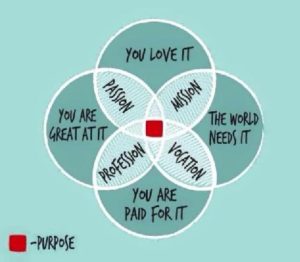Four Steps to a Bountiful Post-career Harvest
“For the unlearned, old age is winter; for the learned, it is the season of harvest.” Hasidic saying
I’m curious. Has your financial planner – assuming you are working with one, which I hope you are – ever dropped the word “harvest” into your conversation as you pour over the charts and graphs and talk “what’s next?”
Let’s look at the word first. Merriam Webster says this:
- Noun: “the act of gathering in a crop; the product or reward of effort.“
- Verb: “reap.”
I may be wrong, but I can’t imagine that word getting a lot of play in insurance sales school.
Now, maybe you are one of the fortunate few who have engaged a financial planner or adviser that thinks “beyond the numbers” and pays more than lip service to the non-financial components of retirement. Financial planners are important, valuable, and necessary. But, chances are they aren’t going to lead you into a deep discussion of the four biggest concerns that retirees have beyond money: (1) boredom; (2) loss of identity; (3) becoming irrelevant; (4) deteriorating health.
Planners sell financial products, not psychological counseling.
How can we avoid these four concerns, reap a reward for our first-half effort, experience a purposeful “harvest”, and avoid a retirement winter?
Here are four suggestions that may help.
1. Build a new “friends list.” With your retirement, we can safely assume you disengaged from the largest, longest-lasting, and one of the most important sets of relationships in your life when you left work. No problem, you say. I’ll stay in touch with most of them. Guess again – 90% of them forgot your name as they gulped down a slice of your retirement cake and watched you vacate the building. Don’t expect return calls – they are all entwined in their own sets of issues still building somebody else’s dream.
Start now to build a new list. Who can you add to keep it alive and vibrant? Who do you know casually that you want to go deeper with because, well, they don’t have time for ageist, senior-citizen-type conversations and they light up a room when they enter. Who can you add that would agree to a plan to hold each other accountable for not heading to geezerville?
Don’t let retirement become a winter void of sustaining relationships. Social isolation is a killer – ARRP reminds us that it is equivalent to smoking 15 cigarettes a day.
2. Commit to a holistic self-care plan. Sorry, but your planner didn’t get a lick of training on how your or his/her biology works while in insurance school. Oh, I appreciate that you will be advised to “take care of yourself.” But what about some detail? That’s on you. Now, perhaps for the first time, you need to be the true CEO of your health.
Your self-care plan should include a relationship with a primary-care provider that goes beyond the typical “drug or cut-it-out” mentality and can engage you in a holistic conversation about your bio-markers, general health condition, what to include, and what to avoid – a trained clinician who is willing to partner with you in your self-care plan. Your “back nine” years will probably require making up for some marginal “front nine” lifestyle patterns, so it shouldn’t be treated casually. Those bad first-half habits have an insidious nature that creep up and manifest on an accelerating basis in our 50s and 60s unless accounted for and slowed down or stopped early in the retirement years.
Consider a commitment to learning about the basics of your cellular biology. Can you explain to me how your body works as effectively as you can about how your lawnmower or dishwasher works? Probably not, if you an American. Why should you when the “fix” is only a $35 copay away? A physician once told me that the biggest killer in our culture is healthcare illiteracy. If we did appreciate how our body works, would we still take 35% of our meals through the side window of our cars? Or spend, on average (as retirees), 49 hours a week one with the La-z-Boy and voice-activated remote.
The book “Younger Next Year: Live Strong, Fit, and Sexy – Until You’re 80 and Beyond” turned the ship for me eight years ago, particularly Chapter Five. Yes, it was written 16 years ago, but your cellular structure hasn’t changed in billions of years. Dr. Lodge’s chapter will help you understand the consequences – good and bad – of your daily treatment of your 100-trillion-cell immune system.
3. Accelerate your learning. Wait, haven’t I done enough of that? Truth is, you probably had pretty well stopped any kind of serious learning a couple of decades ago. Just as you want that physical self to remain vibrant, you need to work even harder at keeping that 2 1/2 pounds of fatty acid between your temples in even better shape.
Fifty years ago, even neurologists believed that neurological senescence was automatic and unalterable. Fortunately, they are all now dead. We’ve learned tons about the brain since then and know that we can build new neural connections for as long as we want. Yep, it’s slower and harder, but what isn’t after 60? What are you not doing that you always wanted to do because you feel it would be too hard or take too much time? There’s your starting point. Stretch yourself mentally with something that takes you outside your comfort zone. Evidence mounts that doing so is antidotal to dementia.
4.Let your purpose find you and go fix something. Have you noticed that a lot of things in our culture are broken right now? What if you headed off the boredom and loss-of-identity that accompanies full-stop retirement and dusted off your peculiarity, your uniqueness and packaged it up with the skills and experiences of 40 years of work and went out and “made a ruckus” aimed at fixing something. What if you got back in the ring – on your terms, at your pace, doing what you may have forgotten you are/were really, really good at and loved doing? You don’t have to look far to find something that needs fixing. Substitute “re-creation” for “recreation” and go change something. And when that’s fixed, go change something else.
Here’s a quote from a recent Chip Conley blog to ponder:
“While recreation and re-creation are not mutually exclusive, the latter promises the elixir of life. An alchemical cocktail of curiosity and wisdom, garnished with fresh sprigs of a beginner’s mind, creativity, and service. To regenerate is to make new again. To retire is to withdraw into seclusion.”

I spent a bunch of my formative years engaged in farming activities. I’ve seen a harvest or two. I’ve also seen what happens if the harvest doesn’t happen. It’s called rot. Rot can be a post-career option. It is for many. But you, dear reader, are a harvester. And society will be better for it.






Incredible and inspiring insights! Appreciate all of the facts you culled so eloquently to encourage us to be and do more with the life we have been given. Kudos!
Excellent read, I just passed this onto a friend who was doing a little research on that. And he actually bought me lunch because I found it for him smile Thus let me rephrase that: Thank you for lunch!
Hi makeagingwork.com owner, Thanks for the well-researched and well-written post!
To the makeagingwork.com administrator, Keep the good content coming!
Hello makeagingwork.com admin, Keep sharing your knowledge!
Hello makeagingwork.com admin, Your posts are always well structured and easy to follow.
Hello makeagingwork.com owner, Great post!
Dear makeagingwork.com admin, Your posts are always well-formatted and easy to read.
Hello makeagingwork.com administrator, Thanks for the well-structured and well-presented post!
Dear makeagingwork.com webmaster, Your posts are always well-structured and logical.